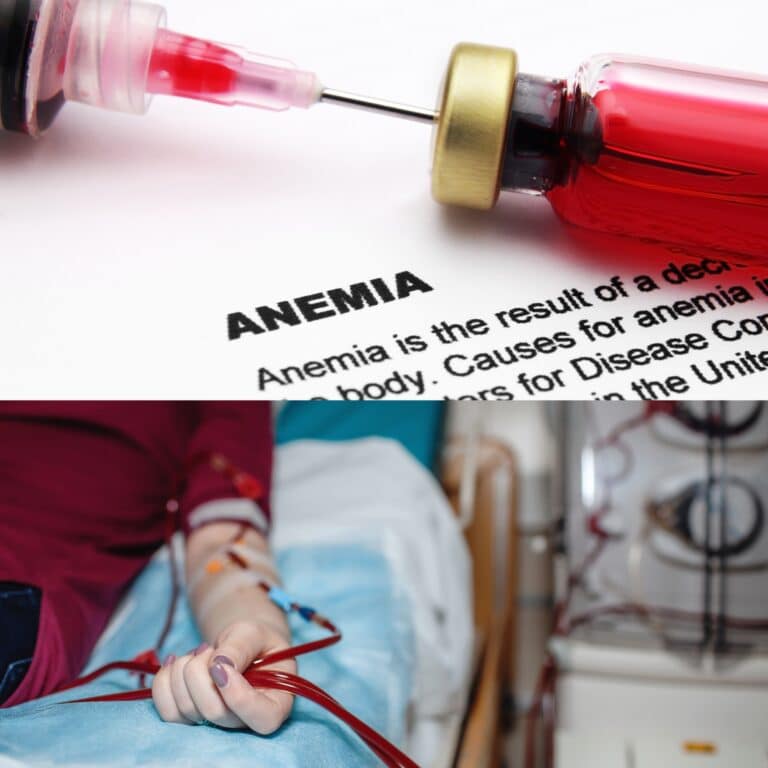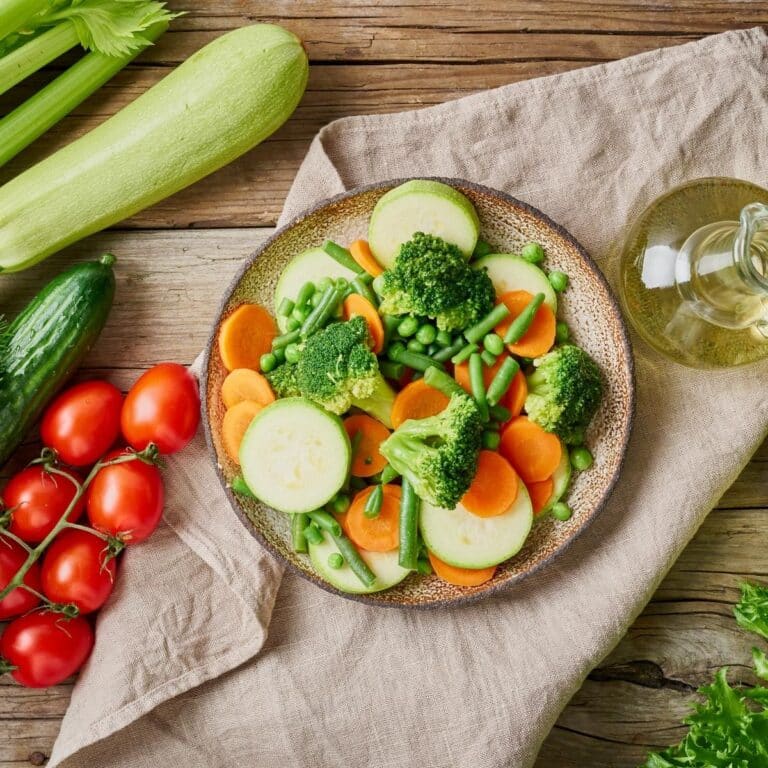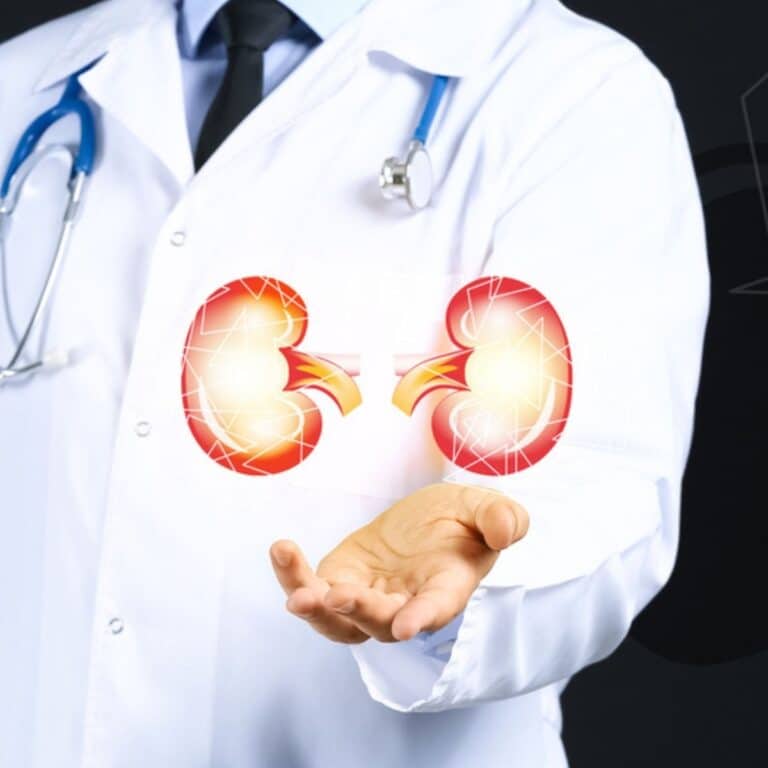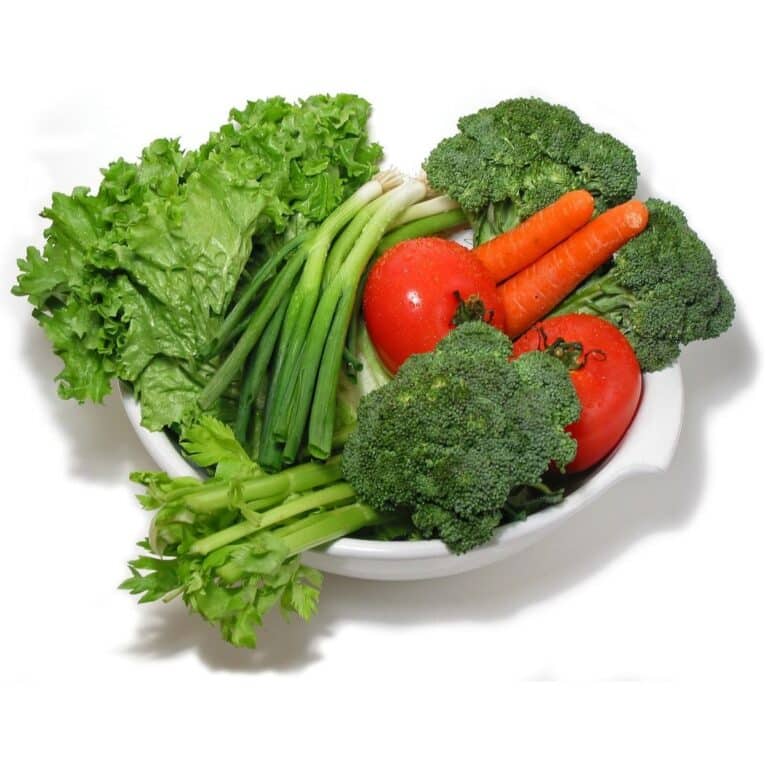Dietary Protein And The Kidney Diet
Dietary protein has been linked to numerous health benefits, but it is also important for those with kidney disease.
The right amount of dietary protein can help improve overall health and well-being while meeting the needs of people with chronic kidney disease.
In this article, we'll discuss the role of dietary protein in a healthy lifestyle and how individuals on a kidney diet plan.
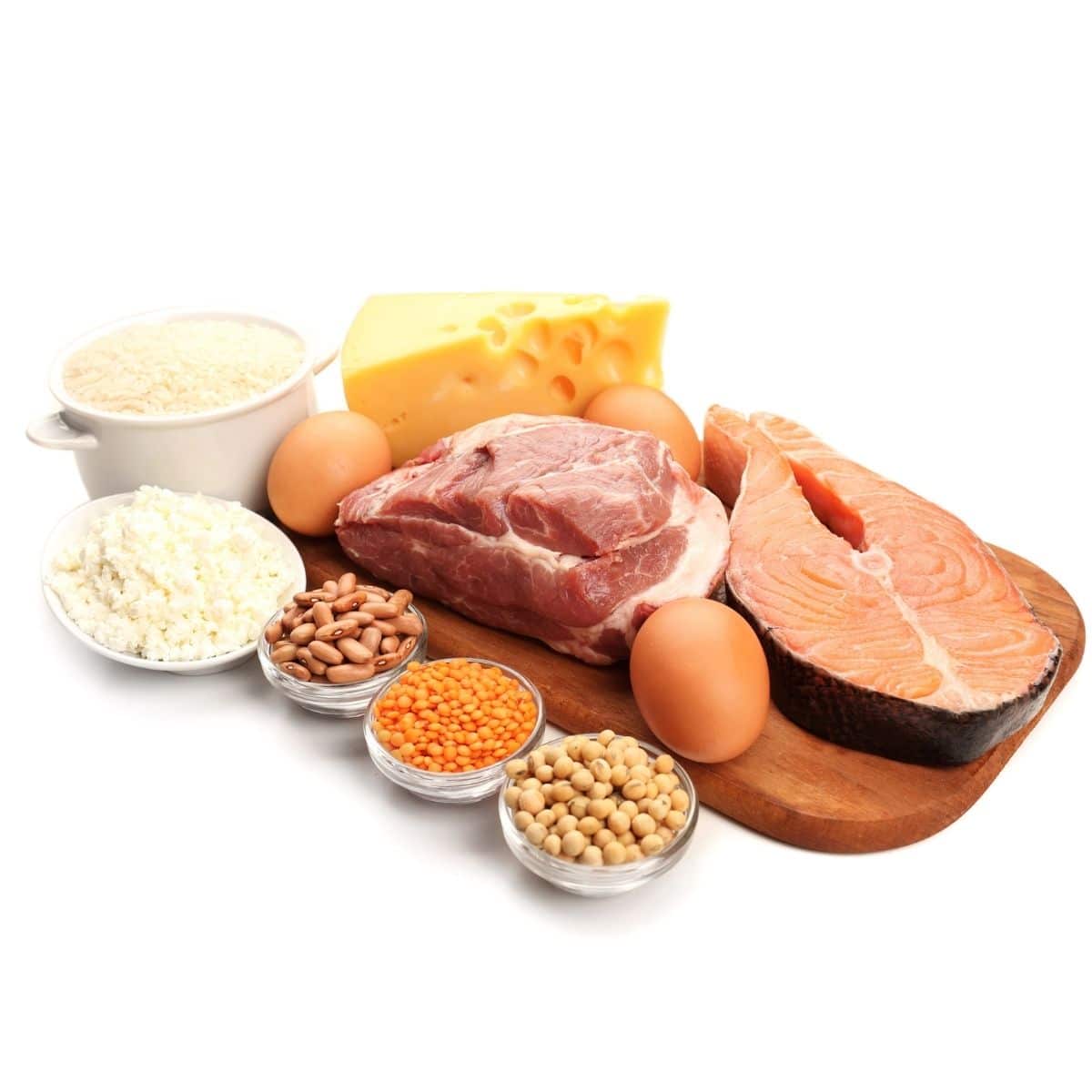
For many, nutrition is key to maintaining good health. However, for those living with chronic kidney disease (CKD), careful consideration must be given when choosing what foods to eat.
Due to the nature of CKD and its impact on the kidneys' ability to filter waste from the bloodstream, certain nutrients - including dietary proteins - may need to be monitored more closely than ever before.
Fortunately, there are ways that those with CKD can still enjoy meals that are both nutritious and delicious!
By understanding some simple guidelines about which proteins are best for them, as well as how much they should consume each day, individuals on a kidney diet can make informed decisions about their food choices without compromising taste or flavor.
Jump to:
- Is Too Much Protein Bad For Your Kidneys?
- Advantages Of Low Protein Diet In Pre-Dialysis Stages of CKD
- Sources And Types Of Protein
- Assessing The Level Of Protein Intake
- Food Restrictions In Chronic Kidney Disease
- Nutritional Considerations For Dialysis Patients
- The Role Of Proteins In Maintaining Health
- Impact Of High Level Of Protein On Kidneys
- Understanding The Appropriate Portion Size For Protein Sources
- FAQ's about Dietary Protein For CKD
- Protein Portion Control
Is Too Much Protein Bad For Your Kidneys?
Caring for your kidneys is essential, and it's natural to be concerned about how much protein you should eat. If you have chronic renal failure or kidney disease, the amounts of protein to consume may seem even more daunting.
Eating too much protein could put added strain on the kidneys, so it’s important to understand what constitutes a normal protein intake.
To start off, let’s look at why someone with kidney problems might need to monitor their daily protein consumption. Protein is an essential macronutrient that helps build muscles and other tissues in our body.
However, when there is an excess of proteins circulating in our bloodstream, these extra proteins are filtered out by the kidneys which can cause them damage over time if done repeatedly.
A low-protein diet can help keep this from happening and reduce any further harm to your kidneys, especially if you are already diagnosed with CKD.
People with CKD often require a special “renal diet” where they limit their total daily intake of proteins and/or phosphorus depending on their individual health needs and specific stages of chronic kidney disease.
This type of dietary intervention has been shown to slow down the progression of kidney disease significantly by reducing the burden placed on already impaired kidneys.
It also helps prevent high levels of waste products like urea nitrogen from accumulating in the bloodstream which can lead to complications such as fatigue and nausea among others.
The nutritional requirements vary between individuals but for patients not on dialysis, the current recommendation is 0.8 grams of protein per kg per day.
For those who are already being treated with hemodialysis of peritoneal dialysis due to advanced kidney disease, higher protein intake is required since these treatments can lead to protein losses by the nature of the procedure itself, compounded by associated inflammation.
About 1.0 to 1.2 grams of protein per kg per day is recommended for these patients.
To ensure optimal results while still maintaining adequate nutrient intake it’s important that patients consult with their doctor before making any adjustments to their diets.
With careful monitoring and precise meal planning each person affected by kidney disease can manage his or her condition in a healthy way that works best for them individually!
It's possible to create a meal plan for kidney disease that works perfect for each individual.
Advantages Of Low Protein Diet In Pre-Dialysis Stages of CKD
When it comes to managing kidney disease, diet can play a key role in maintaining good health.
A low protein diet for kidney disease is one of the most important aspects of this dietary management. This type of diet limits the amount and types of proteins consumed and helps maintain kidney function by reducing the workload on them.
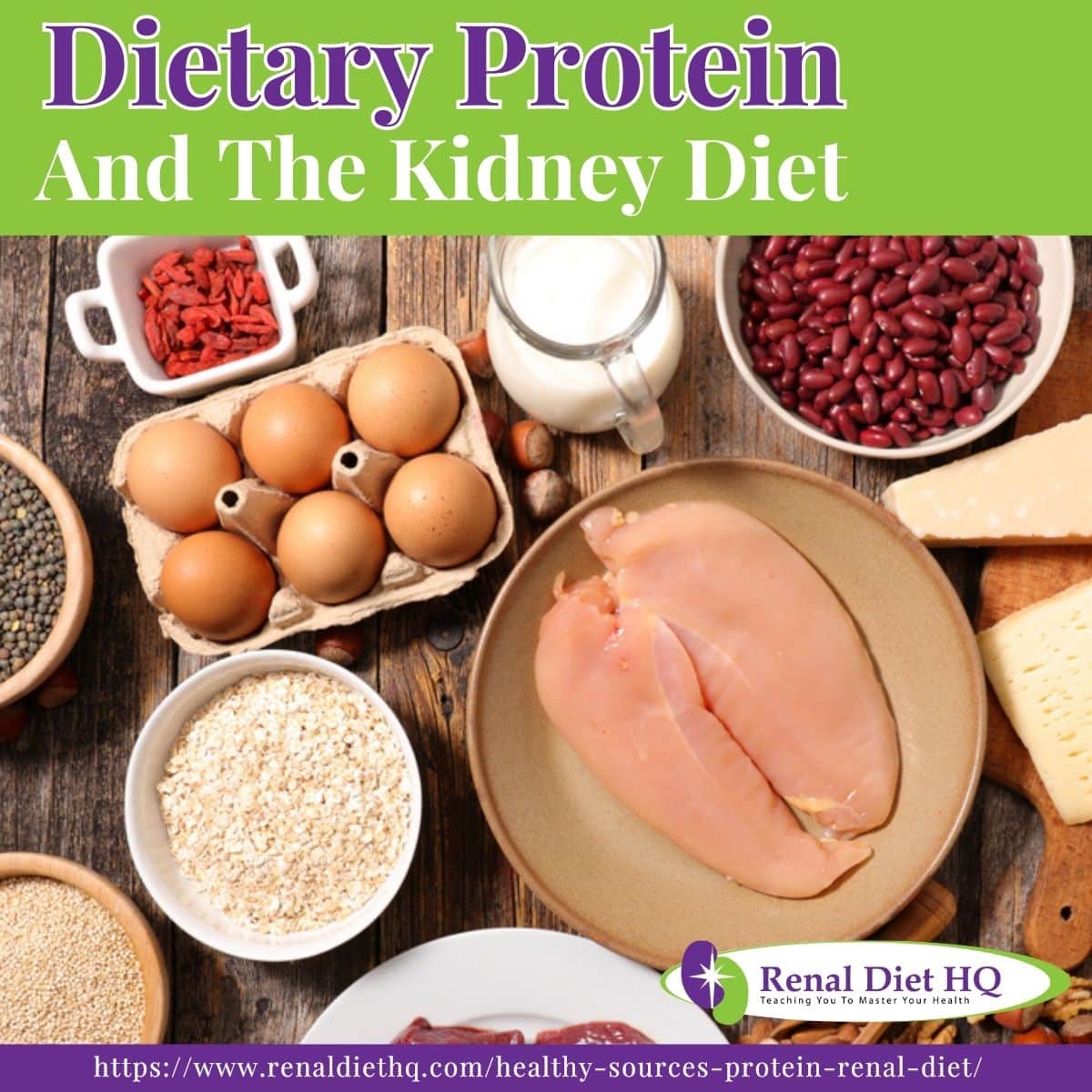
The primary benefit of following a low protein diet is that doing so reduces waste products that are created when proteins are broken down. Excess levels of these waste products can put added strain on already damaged kidneys, leading to further decline in kidney function over time.
Additionally, limiting protein intake also helps reduce cholesterol and triglyceride levels which build up with high-protein diets and cause other long-term risks such as heart disease or stroke.
Here are some ways you can start incorporating non-protein foods into your renal diet:
- Increase your consumption of fruits and vegetables - Fruits and veggies help provide essential vitamins and minerals without adding extra strain on the kidneys from breaking down too much protein. However, as part of the renal diet, low potassium fruits and vegetables are prioritized.
- Make whole grains part of your daily meals - Whole grain breads, bran cereals, pastas, and rice contain complex carbohydrates instead of proteins making them great substitutes for traditional high-protein sources like meat or dairy products.
- Include healthy fats in moderation - Healthy fats found in fish, nuts, seeds, avocados, olive oil, etc., increase nutrient absorption while still providing fewer calories than many animal proteins.
- Experiment with plant based proteins - Plant based proteins like beans, lentils, tofu/tempeh offer both flavor variety as well as plenty of nutritional value minus all the fat associated with animal proteins.
- Avoid processed foods – Processed meats often contain higher amounts of sodium (which worsens fluid retention) compared to fresh cuts plus they don’t provide any additional benefits that come from eating natural ingredients.
- Make low protein shakes for kidney disease - You'll appreciate being able to get your protein out of a low protein shake that's perfect for someone with kidney disease.
By focusing on consuming more non-protein foods instead of relying heavily on those containing high levels of protein, people with chronic kidney disease may be able to improve their health outcomes overall while still enjoying satisfying meals every day!
For More Recipes and Ideas --->> Get Your Free Meals and Recipes That Are Perfect for Pre-Dialysis Diets, Pre-Dialysis with Diabetes, or Dialysis Diets.
Sources And Types Of Protein
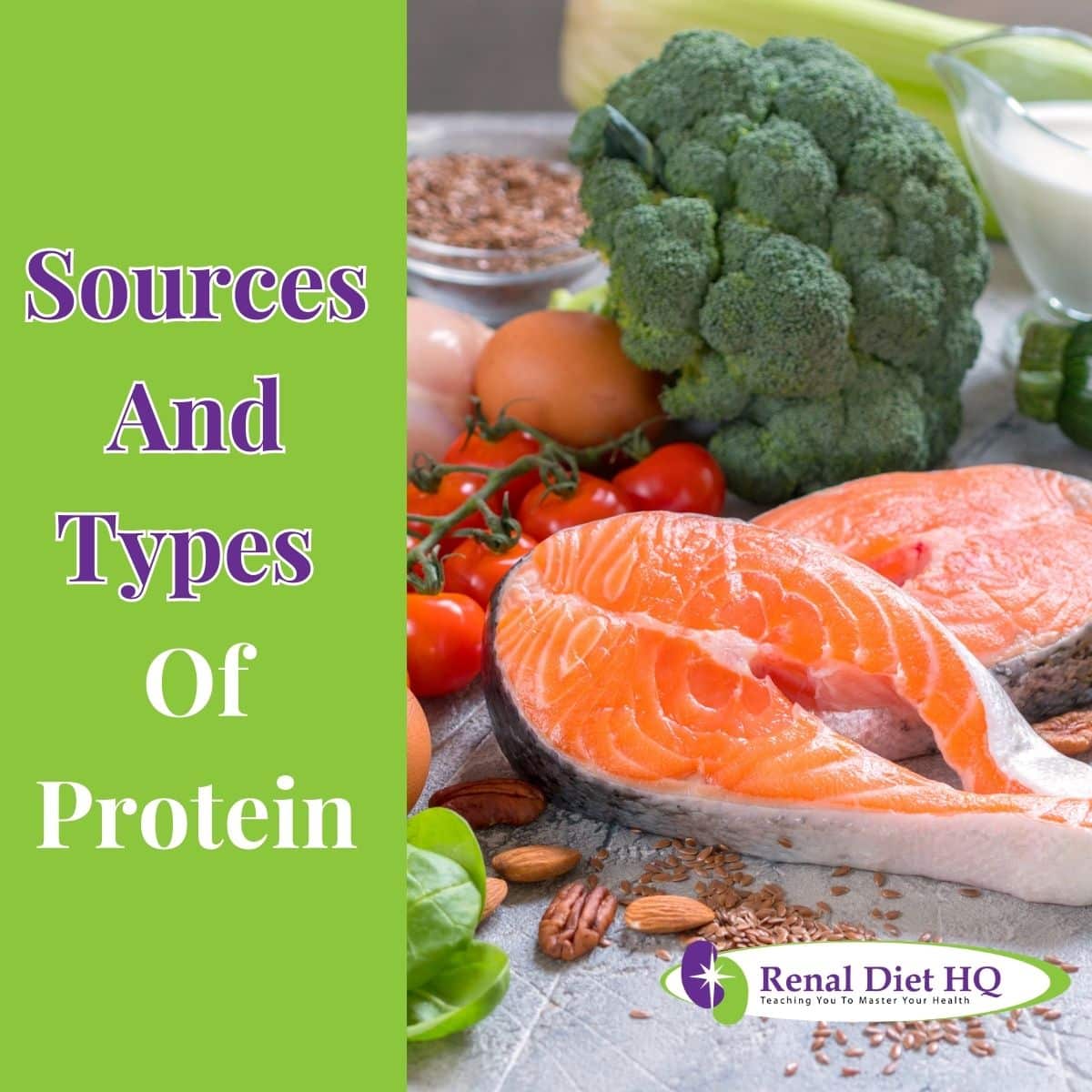
When it comes to dietary protein, the right amount can be beneficial for overall health. But what about those with chronic kidney disease?
Why do you need a pre-dialysis diet plan? For pre-dialysis CKD patients, a low-protein diet is often recommended as part of their renal diet plan.
It's important to understand what proteins are good for and how much dietary protein is necessary in order to stay healthy while managing chronic kidney conditions like glomerulonephritis.
Proteins are essential nutrients that our bodies use for growth, repair, and energy production. They’re made up of amino acids—building blocks that help make up tissues, hormones, enzymes, and other substances vital to life.
A complete dietary protein contains all nine essential amino acids that must come from food sources because they cannot be produced by the body alone.
For someone with kidney disease or renal failure, consuming too much protein can place extra burden on already weakened kidneys. This is the case for those not being treated yet with dialysis, as the kidneys have limited ability to filter excess protein.
This means choosing the right types of proteins is especially important for these patients..
Kidney friendly proteins include...
- Fish such as salmon or tuna (Is canned tuna good for kidney disease?)
- Lean meats such as chicken breast or turkey
- Eggs; dairy products like yogurt and cheese
- Nuts and seeds
- Legumes such as beans and lentils
- Whole grains like quinoa or oats
- Plant-based proteins including soybean products like tofu or tempeh
To give you a fresh perspective on your choices when it comes to protein, here are four new protein sources to consider:
- Cornish hens. These are a more delicate flavor than chicken, and you never have to worry about the meat ending up tough. A Cornish hen may be better for those on a renal diet - the bird isn’t as large as a chicken so the small amount of protein you are eating daily doesn’t leave too many leftovers if you are living alone.
- Lamb. Ground lamb is tastier than ground beef in meatloaf or in burgers. Like with other healthy burgers, add some shredded carrots, onions, garlic, and even a bit of spinach. Even three or four mint leaves will really perk up the recipe and your appetite.
- Ground buffalo (bison). With this one, you can rest assured that the meat hasn’t been modified in any way. You’ll get ground buffalo pretty close to the same ground buffalo that the pilgrims ate. All red meats are generally a good source of iron, and it may be one of the nutrients you have been quite low in recently.
- Heritage turkeys. These birds don’t even look like our modern-day style turkeys. The turkeys are the original ones the pilgrims ate when they came to America. Full of omega 3 fats, heritage turkeys don’t even dry out after cooking and last in the refrigerator longer, too. These are the turkeys that the finest restaurants use because the birds rank highest in taste tests by top chefs worldwide.
It’s also important to remember that portion size matters when dealing with kidney disease. Portion control for CKD patients is important.
Eating smaller amounts more frequently throughout the day may help keep blood urea nitrogen levels under control better than eating larger quantities less often due to enhanced digestion rates associated with smaller meals over extended periods of time.
Being mindful of one's daily intake of dietary protein helps maintain proper balance between consumption and elimination, which will ultimately benefit long term health goals related to kidney care management plans.
Assessing The Level Of Protein Intake
Understanding how much protein is healthy for your kidneys is an important part of managing kidney disease. In this section, we'll discuss the different types of protein sources and their effects on chronic kidney disease (CKD).
| Protein Source | Effect on CKD |
| Plant Proteins | May reduce inflammation in patients with CKD |
| Animal Proteins | High levels may cause damage to kidneys |
| Dairy Products | Can be consumed in moderation |
| Seafood | Can be consumed in moderation |
A balanced diet should include 10-20% of calories from proteins. For people with CKD, it's necessary to limit the amount of animal proteins such as red meat(red meat and kidney disease), poultry, eggs and dairy products.
Plant proteins like legumes can also provide most of the essential amino acids that are beneficial for people with kidney problems.
Additionally, including fiber in your diet can help protect against CKD progression by reducing blood pressure and promoting weight loss.
Seafood should also be limited due to its high phosphorus content which can worsen symptoms associated with CKD.
While it is recommended to moderately limit protein, it is important to note that a low-protein diet isn't recommended either since it has been shown to have negative health consequences.
Eating too little protein can lead to muscle wasting, fatigue and other nutritional deficiencies over time.
People who suffer from advanced stages of CKD but not yet on regular dialysis should aim for 0.6 to 0.8 g/kg body weight per day instead of limiting total protein intake too drastically.
This ensures adequate nutrition while avoiding any potential harm caused by excessive dietary protein consumption.
Knowing what type of food you're eating and understanding the impact they could have on your condition is key when it comes to maintaining optimal health if you have chronic kidney disease.
With careful monitoring and management, individuals suffering from these conditions can still enjoy nutritious meals without placing unnecessary strain on their already weakened organs.
Food Restrictions In Chronic Kidney Disease
Carefully managing the amount of dietary protein when it comes to chronic kidney disease is a balancing act. Too much or too little can have adverse effects on health and quality of life. You can check out these facts about Chronic Kidney Disease.
As such, many individuals with CKD are encouraged to adhere to their individualized recommended protein level in their diet in order to protect their kidneys from further damage.
Certain foods that are particularly high in proteins—such as red meats, organ meats, processed meats, fish and shellfish—may be limited depending on severity of disease and other factors related to individual health status.
It’s important to note that some plant-based proteins tend to be easier on the kidneys compared to animal sources so incorporating legumes, nuts and seeds into meals can provide adequate essential amino acids, while limiting unnecessary strain on kidneys due to excess nitrogenous waste accumulation caused by consuming too much meat or dairy products.
Nutritional Considerations For Dialysis Patients
Firstly, high sodium levels can place extra strain on already weakened kidneys, leading to fluid retention and other complications. Check out these fluids to hydrate with kidney disorder.
As such, limiting salt intake should be a priority when managing CKD—this means steering clear of processed meats like bacon or deli slices, as well as frozen dinners and canned goods.
In addition, certain condiments for kidney disease such as ketchup or soy sauce may also contain hidden sources of salt; check labels carefully before eating these products.
Secondly, potassium-rich fruits and vegetables can become problematic if eaten in excess due to their potential effect on electrolyte balance.
For example, bananas and oranges may need to be avoided entirely by those at advanced stages of CKD; however those with milder forms might still enjoy them in moderation.
Additionally, many dairy products like cheeses and yogurts are known for containing significant amounts of potassium; opt for lower fat versions instead since they tend to have less overall content.
Thirdly, people with kidney disease on dialysis require special dietary restrictions, including a lowered intake of phosphorus. Phosphorus is found in many foods, including dairy products, legumes, seeds, nuts, and organ meats. It is also used as an additive in processed foods.
Generally, the daily limit of phosphorus for those with kidney disease on dialysis is 800 to 1,000 milligrams per day. To stay within this limit, people should avoid foods high in phosphorus, such as cheese, yogurt, and chocolate, and processed foods that contain phosphorus additives.
Whole grains, fruits, vegetables, and lean proteins are all good choices for those on dialysis.
Eating smaller portions, limiting the amount of phosphorus-rich foods, and reading food labels carefully can help dialysis patients maintain the necessary phosphorus level.
Protein requirement for patients undergoing dialysis is higher since the process can filter out protein from the body, and also induce inflammation, which consumes protein as well.
In addition to increasing overall protein intake, dialysis patients also need to pay attention to the type of proteins they eat each day.
Nutritional proteins such as fish, lean meat, eggs and dairy products provide essential nutrients like omega-3 fatty acids and iron - both of which, when consumed in moderate amounts, can help promote better health outcomes.
On the other hand, processed proteins like those found in packaged snacks or fast food items may not offer any significant nutritional value and may even contribute toward fluid retention over time due to their high sodium content.
Given this information about dietary protein restrictions and recommendations for individuals receiving hemodialysis or peritoneal dialysis treatments, it's clear that there are some specific considerations for maintaining optimal nutrition during treatment.
It's therefore suggested that people with CKD work closely with their healthcare team to determine an appropriate daily protein intake based on their individual needs and goals for health management.
Ensuring that their bodies receive the nourishment required during dialysis sessions without putting undue strain on the kidneys themselves. You can always talk to your doctor or nutritionist about how to follow a kidney dialysis diet meal plan.
The Role Of Proteins In Maintaining Health
Proteins are essential for maintaining health. They serve as building blocks for our muscles, bones, skin, and blood cells.
Proteins are essential components of the human body, performing a variety of important roles in maintaining health. They are involved in virtually every cellular process, such as energy production, cell division, and tissue repair.
Proteins also play a crucial role in wound healing and clotting factors, which help the body stop bleeding.
Albumin production is also a major role of proteins, as these proteins help to transport nutrients, hormones, and other molecules throughout the body.
Additionally, proteins help the body's immune system by producing antibodies that fight off infection and protect the body from disease.
Another important role of proteins is to provide structure and stability to the body. Many proteins are involved in the formation of muscle, bone, and other connective tissues.
Proteins also act as enzymes, which are responsible for breaking down and synthesizing various molecules in the body. Enzymes are essential to the metabolic processes that keep the body functioning.
In addition to the roles mentioned above, proteins are also involved in regulating gene expression. Proteins interact with DNA to control which genes are expressed in a given cell.
This process is important for normal cellular function, as it helps ensure that the right genes are expressed in the right cells and at the right time.
Overall, proteins are essential to the proper functioning of the human body and they play many important roles in maintaining health. They are involved in energy production, tissue repair, clotting factors, albumin production, and immunity.
Additionally, proteins provide structure and stability and regulate gene expression. Without proteins, the body would not be able to function properly and would be extremely vulnerable to disease and illness.
Too much protein can be bad for a person's kidneys since protein can increase pressure, thereby putting strain on these organs. A high-protein diet may increase the risk of developing kidney disease or worsen existing conditions. You can even check out these high protein snacks for dialysis patients.
On the other hand, too little protein can also be detrimental given all the mentioned essential roles it plays for the maintenance of life. This emphasizes the need for the proper amount and balance of protein for CKD patients.
Being guided by your trusted healthcare professional such as your doctor and your dietician can help you achieve this delicate yet lifesaving balance.
Impact Of High Level Of Protein On Kidneys
Too much protein in the diet can cause serious progression of chronic kidney disease. Even healthy adults can suffer from kidney injury from excessive protein if not monitored carefully. Here’s what you need to know about how excess dietary proteins affect our kidneys:
- A low-protein diet is often recommended for people with stage 3 and 4 of chronic kidney disease (CKD). Here is a stage 3 kidney disease sample diet.
- Too much protein in the body causes an increase in urea nitrogen, which is found in urine when there's a high level of protein present. This increases the strain on the kidneys as they work harder to expel it from the body.
- High-level proteins also increase glomerular filtration rate (GFR), which can overload the kidneys, adding further stress on the organ, and eventually result in CKD progression ultimately manifesting with permanently decreased GFR.
The best way to avoid any potential harm caused by excessive dietary protein is to ensure that you're getting enough good quality proteins while maintaining the right levels of protein intake throughout all stages of CKD.
Good sources include lean meats such as chicken and fish, legumes like beans and lentils, nuts and seeds, tofu, eggs, and dairy products like yogurt and cheese. Eating more plant-based proteins instead of animal proteins will help reduce any risks associated with increased dietary proteins.
It's important to note that everyone has different needs when it comes to their nutrition requirements - so it's essential to always consult with your doctor before making changes to your diet plan, particularly if you have already been diagnosed with CKD.
By understanding how higher levels of protein in the diet affect your kidney health, you can take proactive steps in achieving an optimal diet plan that will slow down the progression of your disease.
Understanding The Appropriate Portion Size For Protein Sources
For those with stage kidney disease, understanding the appropriate portion size for proteins is essential to maintain health. Protein needs vary from person to person based on body size, activity level and other factors.
Therefore, it is important to know what the best protein sources are for stage kidney disease as well as what an appropriate portion size looks like.
When considering the best proteins for people with kidney diseases such as CKD , fish, poultry or lean cuts of red meat are usually recommended due to their high-quality source of protein while being low in phosphorus and potassium content. You may want to check out some of these low phosphorus meats!
To determine how much protein a person should eat each day when they have CKD, it helps to calculate one’s approximate daily calorie needs using a formula known as “calories per kilogram” (CK).
With this information in hand, a renal dietitian can help develop an eating plan tailored specifically for someone's individual nutritional needs.
Once the patient understands the amount of calories needed for optimum health and weight management – which may include several small meals throughout the day – then determining the appropriate portion sizes becomes easier.
Experts recommend that patients with CKD consume three ounces of cooked lean meats at mealtime; however, some individuals may require more or less depending on their caloric/protein requirement.
It is also beneficial to incorporate healthy fats into meals such as olive oil or avocados since these foods provide key nutrients necessary for proper functioning of cells despite being higher in fat content than other proteins like chicken breast or ground beef.
In addition to knowing what type and how much protein you need each day if you have CKD, it is equally important to monitor your intake carefully.
Too much protein could lead to excess waste buildup in your bloodstream causing further damage to your kidneys while too little would not give them enough energy or fuel they need to function properly throughout the day.
Eating smaller portions more frequently has been proven effective in helping people manage their dietary restrictions without feeling deprived or hungry all time - so always speak with your doctor about any concerns related to food choices!
FAQ's about Dietary Protein For CKD
One way to slow the progression of CKD is with a low-protein diet. Protein is essential for the body to function, but too much can be damaging to the kidneys.
A low-protein diet can help CKD patients by reducing the amount of work their kidneys have to do, which can help slow the progression of the disease.
In addition to reducing the load on the kidneys, a low-protein diet can help CKD patients by providing them with the essential nutrients they need. Protein-rich foods such as meat, fish, eggs, and dairy contain essential amino acids that are important for building and maintaining muscle.
However, these foods can also be high in phosphorus, potassium, and sodium, which can accumulate in the body when you have impaired kidney function. Let's not forget that it's possible to start improving kidney function with diet.
A low-protein diet can help CKD patients by providing them with essential nutrients without the added burden of too much phosphorus, potassium, and sodium.
A low-protein diet can also help CKD patients by helping to maintain a healthy body weight. Protein-rich foods are often high in calories and fat, which can lead to weight gain.
A low-protein diet can help keep CKD patients at a healthy weight, which can reduce the strain on their kidneys.
There are also some other benefits of a low-protein diet for CKD patients. It can help reduce inflammation and help reduce the risk of complications such as high blood pressure and heart disease.
It can also help improve the patient’s overall health by providing the necessary nutrients without placing too much strain on the kidneys.
Overall, a low-protein diet can be a beneficial way to slow the progression of CKD. It can provide CKD patients with the essential nutrients they need while reducing the burden on their kidneys.
It can also help keep CKD patients at a healthy weight and reduce the risk of complications.
It is important for CKD patients to work with a dietitian or other healthcare professional to develop a kidney diet plan that meets their individual needs.
Are you unsure how to find out what your current level of protein intake is? Don't worry, there are a few easy steps that can help. Knowing the amount of dietary protein in your daily diet is an important part of making sure your body gets the nutrition it needs while staying healthy.
Here's what you need to do:
Consult with your doctor or dietitian about testing for protein levels. They will be able to provide advice on which tests may be necessary and where to go for them.
Keep track of everything you eat each day by recording it in a food diary or using an online tracking app such as MyFitnessPal or FitBit. This will give you a better idea of how much protein you're consuming over time.
Pay attention to portion sizes when eating foods high in protein, like lean meats, fish, eggs, nuts, legumes, and dairy products. Eating too much protein can have negative health consequences.
Knowing the right amount of dietary proteins for your individual needs is essential to maintaining good health and achieving any fitness goals you might have set for yourself. It’s also beneficial to make sure that these proteins come from quality sources so that they contain all the essential amino acids our bodies require but cannot manufacture themselves.
Keeping track of your daily meals and snacks helps ensure that you don’t exceed recommended amounts while still getting enough nutrients from natural whole-food sources rather than processed foods containing artificial additives.
Making small changes here and there can add up quickly; reducing overall portions if needed and increasing vegetable content along with other nutrient-rich ingredients can replace some animal proteins without sacrificing flavor or satisfaction at mealtime.
Working together with your healthcare provider through regular check-ins allows for more accurate monitoring, diagnosis, and treatment if needed due to medical conditions or lifestyle choices impacting dietary habits.
Taking control now could mean avoiding potential problems down the road!
Protein is essential for a healthy diet, and many people with kidney-related health issues may have to modify their intake. Plant-based sources of protein can be suitable for a kidney diet - but which ones? Let’s explore the options available to those seeking out plant-based proteins that are safe and nutritious.
Firstly, consider legumes such as beans, peas, lentils, chickpeas and peanuts. These are all rich in protein, fiber and micronutrients such as iron and zinc - perfect for adding flavor to meals while also providing much needed nutrients. Plus, you can make some amazing recipes, like this Southwestern Chicken and White Bean Soup.
They're also low in potassium so they won't strain the kidneys like some other food groups might. Additionally, soy products such as tofu or edamame offer high levels of plant proteins too!
Next up on our list of potential plant proteins are seeds – think pumpkin seed butter or chia seeds sprinkled over cereal or yogurt.
Seeds contain vitamins A, D & E plus minerals including magnesium, calcium and phosphorus – making them an ideal addition to any meal where you want to add extra nutrition without compromising on taste.
Not only do these foods provide plenty of protein but they’re incredibly versatile too meaning you can incorporate them into lots of different recipes from salads to kidney friendly soups and stews.
Lastly let's look at nuts; almonds especially make a great snack due to their high level of monounsaturated fat which helps keep your heart healthy whilst providing both dietary fiber and a nutty crunchy taste.
You could even try adding walnuts or cashews into smoothies or oatmeal to give yourself an additional boost of energy throughout the day!
No matter what type of plant-based protein you choose it's important to speak with your doctor first before introducing new foods into your diet if you have existing kidney conditions.
With the right advice though there's no reason why you can't enjoy tasty kidney friendly snacks full of beneficial nutrients that will help support optimal health!
Chicken, turkey, pork and beef (is ground beef good for kidney disease?) are allowed on a renal diet. You can cook these meats in a number of ways. Here are some examples:
Grilled chicken breast with rosemary
Barbecued turkey wings
Braised turkey legs in apricot sauce
Roasted turkey breast and vegetable-rice stir-fry
Pork chop with applesauce
Meatloaf
Tasty beef ribs
Prime rib with horseradish
Top sirloin steak with onions
Protein Portion Control
Following a low-protein diet can slow progression of chronic kidney disease. While this type of diet may be necessary for those with CKD, it's important to pay attention to your body and ensure that you are getting the right amount of protein.
It's also important to look into plant-based sources of protein so that you can get all the nutrients you need while adhering to the restrictions imposed by a kidney diet.
Above all else, make sure to avoid foods high in phosphorus, potassium, sodium and other minerals which could aggravate existing conditions or create new ones.
Like most things in life, keeping a healthy balance is key when it comes to dietary proteins and the kidney diet–not too much or too little but just enough for optimal health.
You can also check out this kidney diet beginner training, so you can get off on the right foot with your new diet plan.






